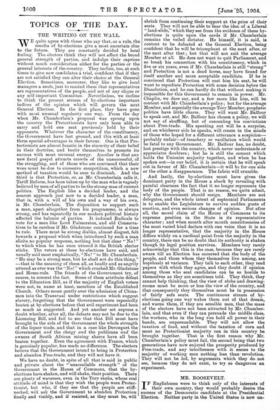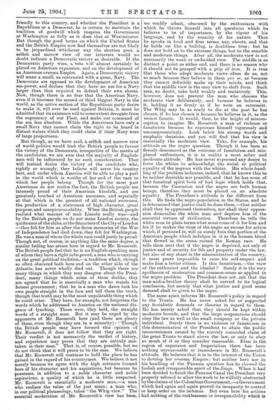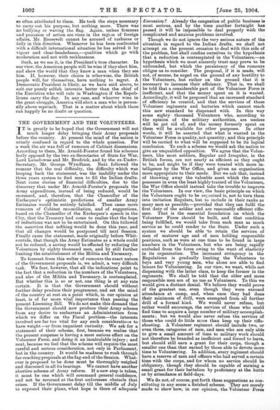I F Englishmen were to think only of the interests of
their own country, they would probably desire the success of the Democratic candidate at the Presidential Election. Neither party in the United States is now un- friendly to this country, and whether the President is a Republican or a Democrat, he is certain to maintain the tradition of goodwill which inspires the Government at Washington as fully as it does that at Westminster. But though the good terms on which the United States and the British Empire now find themselves are not likely to be jeopardised whichever way the election goes, a selfish and narrow view of our interests would no doubt indicate a Democratic victory as desirable. If the Democratic party wins, a veto will almost certainly be placed on American expansion, aud on the development of an American oversea Empire. Again, a Democratic victory will mean a small, as contrasted with a great, Navy. The Democrats are opposed to the development of American sea-power, and declare that they have no use for a Navy larger than that required to defend their own shores. Now, though there is no fear that the American Navy, even if it becomes the second or third biggest Navy in the world, as the active section of the Republican party desire to_ make it, will ever be used against Britain, it must be admitted that its existence will to some extent derogate from the supremacy, of our Fleet, and make our command of the sea, less absolute. While the Americans have only a small Navy they cannot claim the right to be heard in distant waters which they could claim if their Navy were of large proportions.
But though, as we have said, a selfish and narrow view of world-politics would lead the British people to favour the victory of the Democrats, irrespective of the merits of the candidates, we are sure that the majority of English- men will be influenced by no such consideration. They will instead desire the victory of the candidate who, rightly or wrongly, they believe will serve his country best, and under whom America will be able to play a part in the world which is worthy of her and of the race to which her people belong. Though for the most part Americans do not realise the fact, the British people are intensely proud of their American kinsfolk, and are 'genuinely touched at American successes, and especially at that which is the greatest of all national successes, the production of a statesman of high character, great purpose, and conspicuous ability. When the British people realised what manner of man Lincoln really was—and by the British people we do not mean London society, the quidnuncs of the clubs, or the financiers of the City of London —they felt for him as after the fierce memories of the War of Independence had died down, they felt for Washington. He was a 'Ilan of whom the Whole race could justly be proud. Though not, of course, in anything like the same degree, a similar feeling has arisen here in regard to Mr. Roosevelt. The British people feel that he is an English-speaking man of whom they have a right tobe proud, a man who is carrying on the great political tradition,—a tradition which, though so often obscured both here and on the other side of the Atlantic, has never wholly died out. Though there are many things in which they may disagree about the Presi- dent, many things which some of them dislike, they are agreed that he is essentially a man who stands for 'honest government; that he is a man who dares look his own people straight in the face and tell them the truth, though that truth may be the most unpalatable thing which he could utter. They have, for example, not forgotten the words which he addressed to America on the national dis- grace of lynching. Those were, they held, the straight words of a straight man. But it may be urged by the opponents of Mr. Roosevelt here (and there are plenty of them, even though they are in a minority) : "Though the British people may have formed this opinion of Mr. Roosevelt, it does not follow that they are right. Their verdict is not necessarily the verdict of history, and experience may prove that they are entirely mis- taken in their man. That is, of course, possible, but we -do not think that it will prove to be the case. We believe that Mr. Roosevelt will continue to hold the place he has gained in the regard of his countrymen. We believe it not -merely because we agree with the high estimate formed here of his character and his aspirations, but because he possesses, in addition to a noble character and noble aspirations, a quality, of which he is little suspected. Mr. Roosevelt is essentially a moderate man,—a man • who realises the value of the just mean ; a man who, in our political phraseology, takes "the Whig view." The essential moderation of Mr. Roosevelt's view has been, believes to be of importance, by the vigour of his language, and by the tenacity of his nature. That he speaks in loud and firm terms, nay, shouts, and that he holds on like a bulldog, is doubtless true ; but he does not hold on to the extreme things, but to the sensible and moderate things. After all, the moderate vie* is not necessarily the weak or undecided view. The middle is as distinct a point as either end, and there is no reason why it should not be grasped with a grip of iron. It is true that those who adopt moderate views often do so, not so much because they believe in them per se, as because they cannot definitely make up their minds, and think that the middle view is the easy view to shift from. Such men, no doubt, take hold weakly and tentatively. This, however, does not prevent the man who chooses the moderate view deliberately, and because he believes in it, holding it as firmly as if he were an extremist. The Whig may be as ready to die at the post he has chosen, if he has chosen it because he believes in it, as the veriest fanatic. It would, then, be the height of miscon- ception to imagine Mr. Roosevelt a man of violence or fanaticism because he expresses himself vigorously and uncompromisingly. Look below his strong words and emphatic decisions, and you will find that his view is essentially the moderate view. Take, for example, his attitude on the negro question. Though it has been so fiercely denounced as the outcome of fanaticism and mis- placed enthusiasm, it is in reality a most sober and moderate attitude. He has never eKpressed any desire to force the whites to acknowledge the social or political equality of the negroes with the whites. His whole hand- ling of the problem indicates, indeed, that he knows this to be neither desirable nor possible, and that he has none of that fanatical spirit born of bad logic which holds that, because the Caucasian and the negro are both human beings, therefore they must be placed on an absolute equality. The President's attitude is far different from this. He finds the negro population in the States, and he is determined that justice shall be done them,—that neither shall they be oppressed themselves, nor shall their oppres- sion demoralise the white man and deprive him of the essential virtues of civilisation. Therefore he tells the white man in plain terms what must come of it for him and his if he makes the vices of the negro an excuse for action which, if persisted in, will as surely tuin that portion of the American people which indulges in it as the human blood that flowed in the arena ruined the Roman race. He tells them next that if the negro is deprived, not only of justice and of security for life and property under the law, but also of any share in the administration of the country, it must prove impossible to raise his self-respect and make him a better citizen. Is this fanaticism,—the view of the enthusiast and the idealist ? Surely it is the very apotheosis of moderation and common-sense as applied to the negro problem. The President does not ask that the man-and-a-brother theory shall be carried to its logical conclusion, but merely that what justice and good sense demand shall be given to the negro.
The same spirit informs Mr. Roosevelt's policy in regard to the Trusts. He has never asked for or supported any Socialistic demands or theories in regard to them. He has merely asked that they should be kept within moderate bounds, and that the large corporations should obey the law as well as the small company or the private individual. Surely there is no violence or fanaticism in this determination a the President to abate the public inconveniences caused by the scarcely concealed claim of the great Trusts to stand above the law, or only to obey so much of it as they consider reasonable. Even in the region of expansion and Imperialism there has been nothing unreasonable or immoderate in Mr. Roosevelt's attitude. He believes that it is to the interest of the Union to develop her oversea Empire ; but neither here nor in his handling of the Panama question has he showed the foolish and irresponsible spirit of the Jingo. When it had been decided to finish the Panama Canal the President very properly refused to allow the work to be wilfully obstructed by the claims of the Colombian Government,—a Government which had again and again proved its incapacity to control or keep order on the isthmus. But even here his actions had nothing of the recklessness or irresponsibility which is so often attributed to them. He took the steps necessary ,to carry out his purpose, but nothing more. There was no bullying or waving the flag. Again, unless firmness and precision of action are vices in the region of foreign affairs, Mr. Roosevelt cannot be accused of rashness or folly in this direction. Whenever he has been confronted with a difficult international situation be has solved it by yigour and clear-headedness,—qualities which go with moderation and not with recklessness.
Such, as we see it, is the President's true character. In our view, the American people will be wise if they elect him, and show the world that they know a man when they see him. If, however, their choice is otherwise, the British people will, for themselves, have nothing to regret. A Democratic President is likely, as we have said above, to suit our purely selfish interests better than the chief of the Executive who will rule in Washington if the Repub- licans carry the day. In any case, and whoever wins in the great.struggle, America will elect a man who is person- ally above reproach. That is a matter about which there can happily be no doubt or question.
THE GOVERNMENT AND THE VOWNTEERS.




























































 Previous page
Previous page